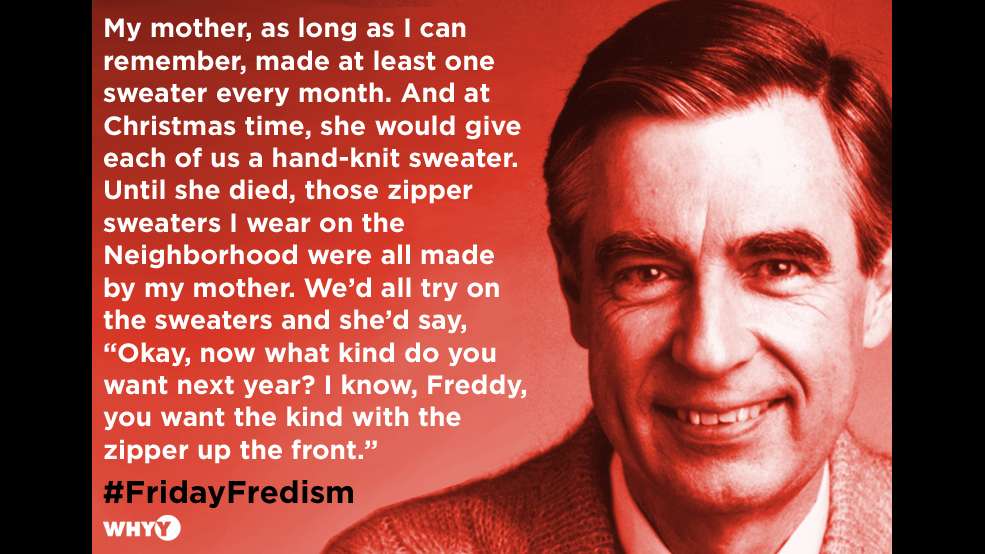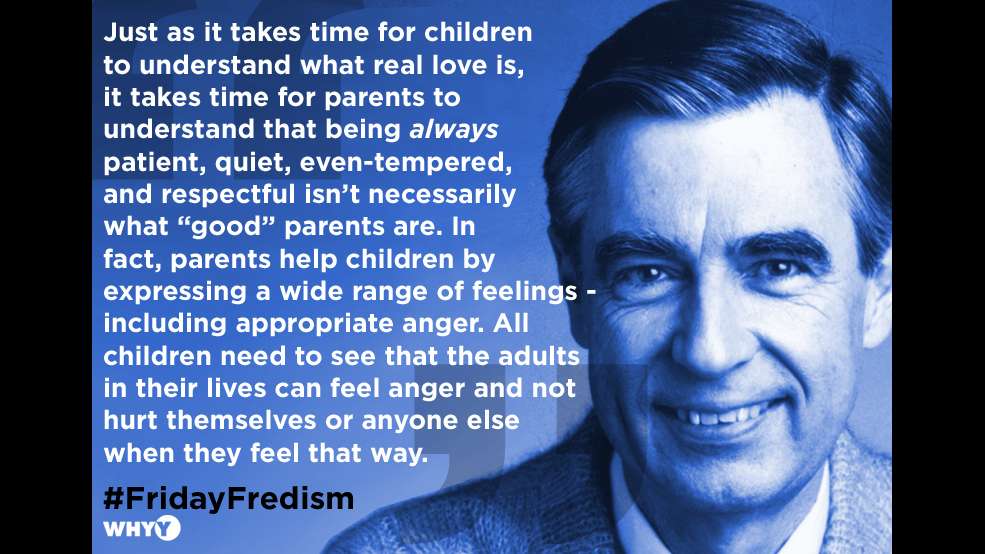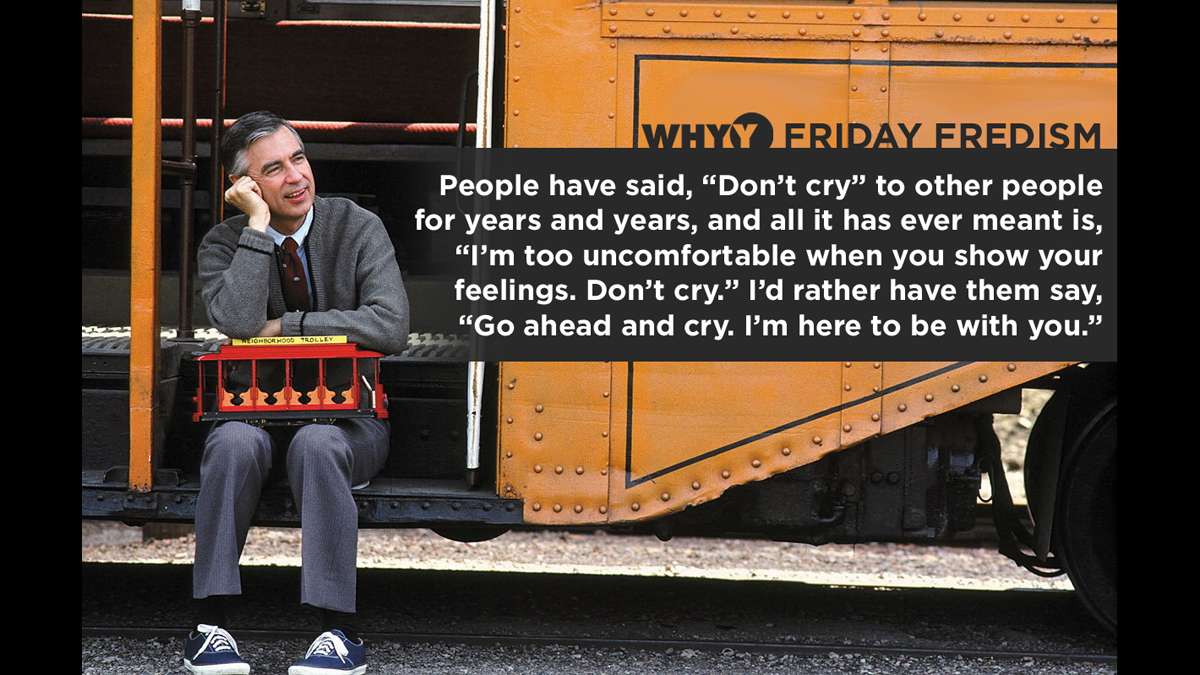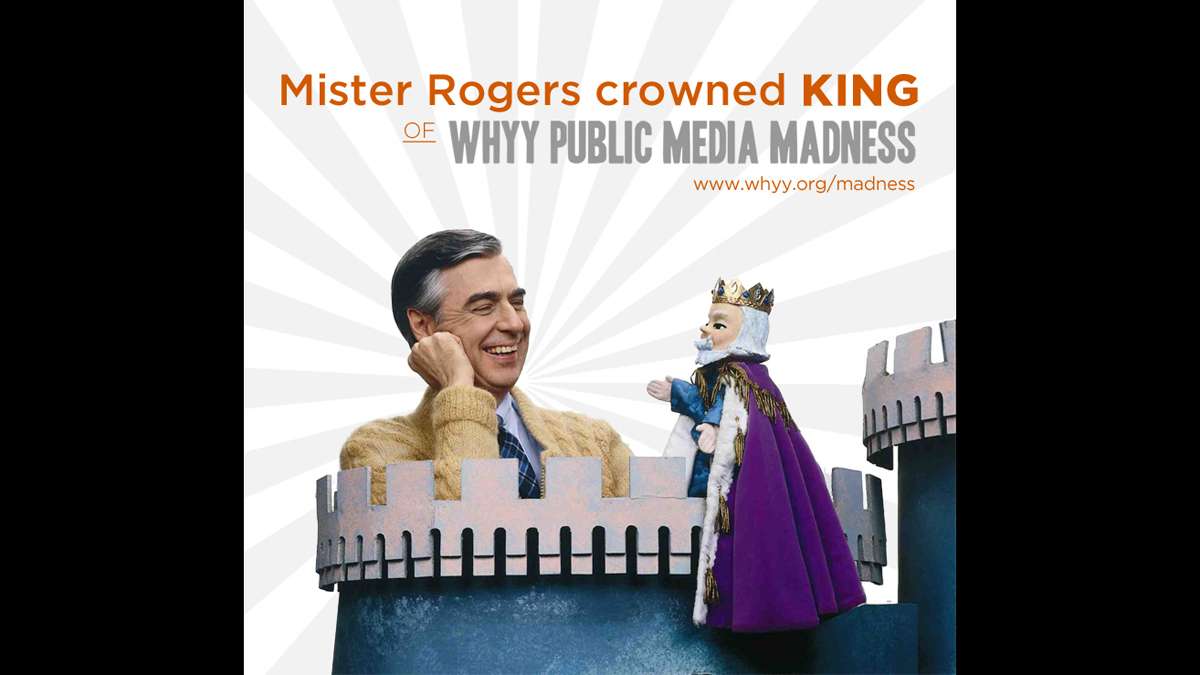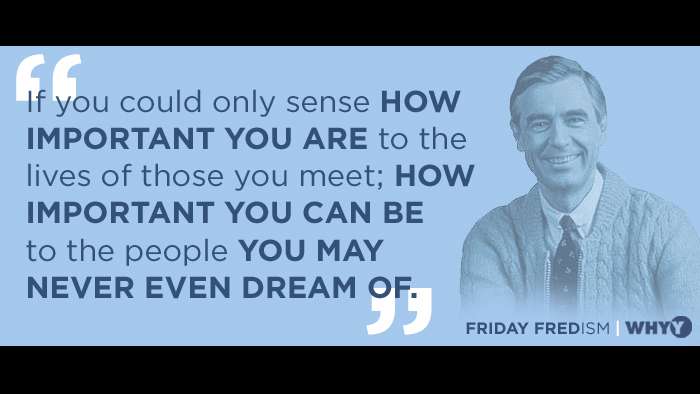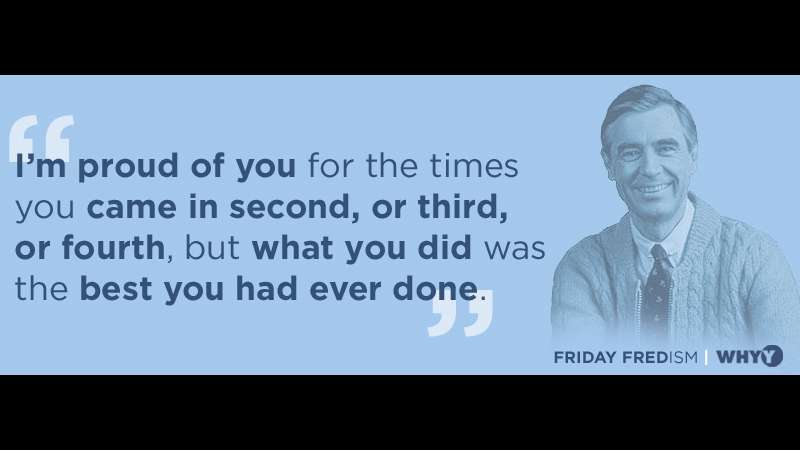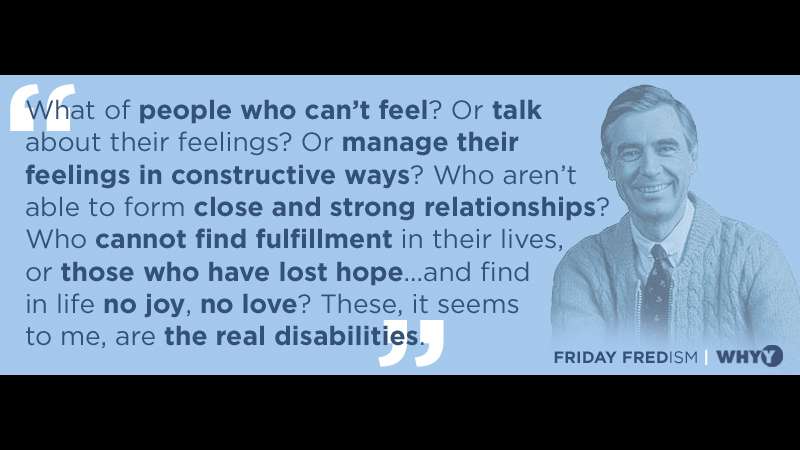The Year of Fred: honesty, playfulness, warmth and wisdom
The messages of Mister Rogers have quietly become a major theme of the year. Fred Rogers passed away in 2003, but he remains a powerful symbol to this day for many reasons.
In some ways, 2014 has subtly been The Year of Fred at WHYY. Our weekly #FridayFredism posts have been extremely popular on Facebook. In March, Mister Rogers was voted King of Public Media by fans around the world in WHYY’s PBS vs. NPR Public Media Madness tournament. His face always visible, his soothing messages always present, Mister Rogers has just quietly become a major theme of the year.
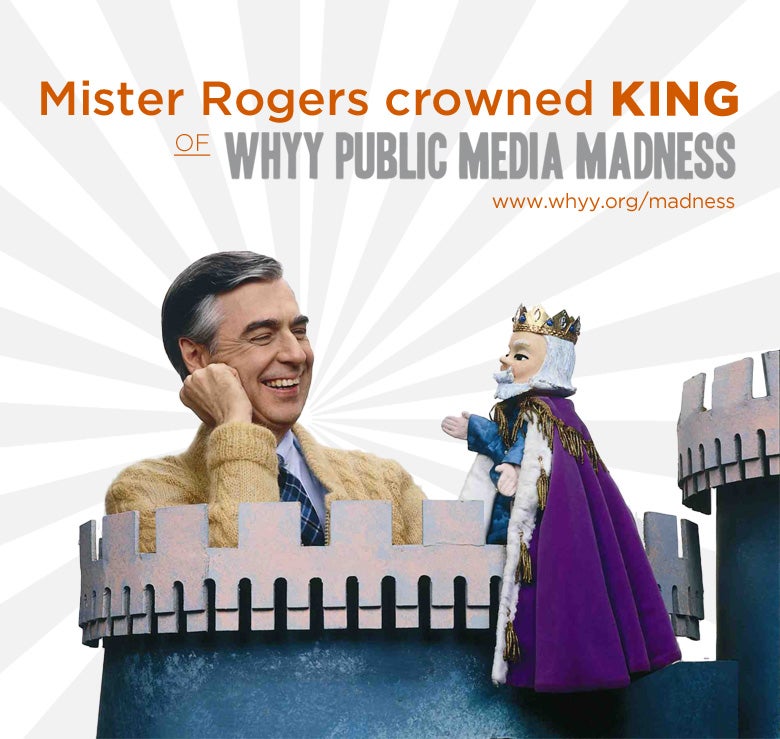
As only Fred could, he managed to do it quietly, peacefully, and in a characteristically understated manner. Mister Rogers passed away in 2003, but he remains a powerful symbol to this day for many reasons.
He represents a simple, singular person doing what he can to make the world a better place. His words continue to resonate for people of all ages because the lessons are so timeless, so simple … and, yet, so easily forgotten in the chaos of everyday life.
I watched some of “Mister Rogers’ Neighborhood” as a kid, but I wasn’t really into him. I was more of a “Sesame Street” guy. Fred was too chill for me. As I got older — and I suspect this is the case for many people — his brilliance and honest and patient charm became more apparent.
A constant journey of self-discovery
Mister Rogers does not demand or expect for us to be perfect people. Indeed, he recognized just how impossible a concept perfection is. He devoted much of his life to teaching young people (and reminding grown people) that being a good person, loving yourself, dealing with pain and disappointment are constant struggles. We will never master them, because they are impossible to master. Therefore, we must simply try. And when we fail, we must not dwell on that failure, but learn from it.
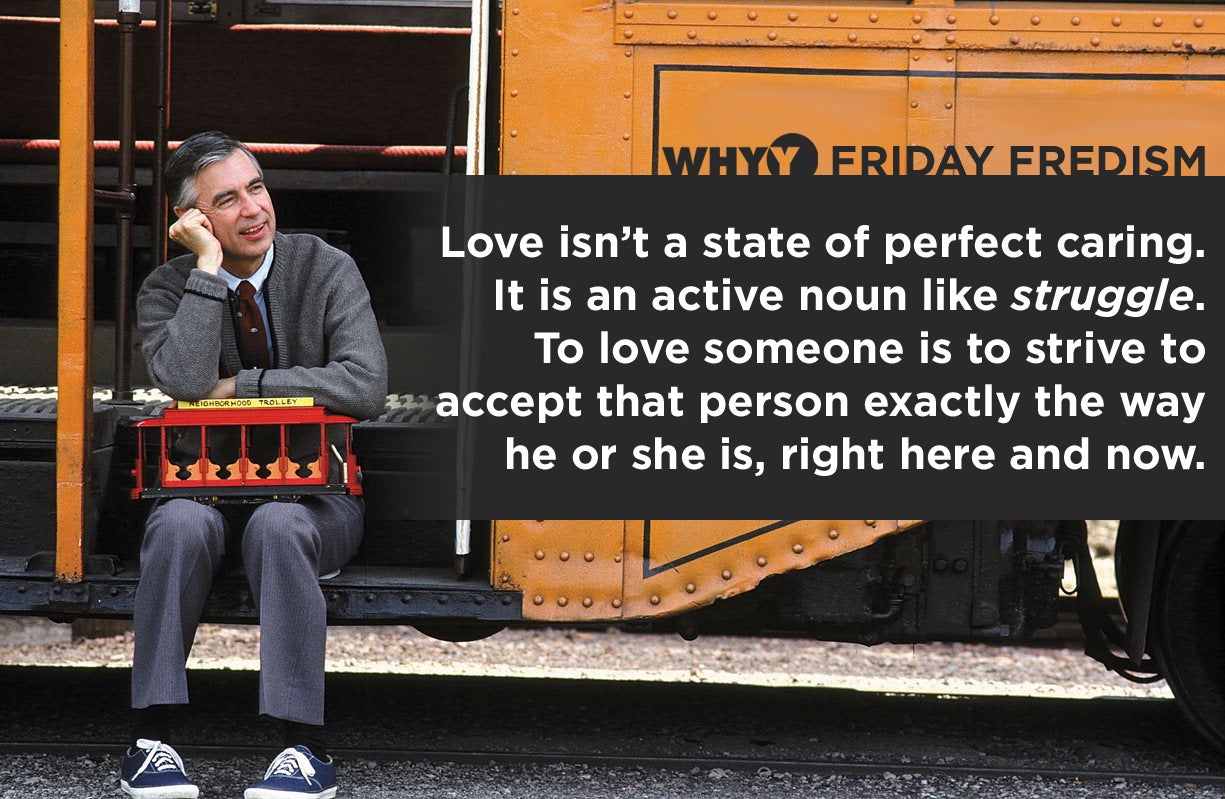 Mister Rogers taught that being mad or sad wasn’t a bad thing. He taught that being flawed was normal. He encouraged us to come to terms with our emotions. He asked us to join him on a constant journey of self-discovery, a search for our true and honest selves. It’s easy to think of him as some out-of-touch, folksy throwback. Some people get distracted by the slow cadence of his voice, his silly sweaters and the ease with which he can be parodied. It’s obviously fun to laugh along with Eddie Murphy when he takes us to “Mister Robinson’s Neighborhood,” or any number of sound-alike send-ups offered by funny sender-uppers over the decades.
Mister Rogers taught that being mad or sad wasn’t a bad thing. He taught that being flawed was normal. He encouraged us to come to terms with our emotions. He asked us to join him on a constant journey of self-discovery, a search for our true and honest selves. It’s easy to think of him as some out-of-touch, folksy throwback. Some people get distracted by the slow cadence of his voice, his silly sweaters and the ease with which he can be parodied. It’s obviously fun to laugh along with Eddie Murphy when he takes us to “Mister Robinson’s Neighborhood,” or any number of sound-alike send-ups offered by funny sender-uppers over the decades.
Caricature can replace the reality of the man. People oversimplify his message, thinking Mister Rogers was more about “be nice and happy all the time” than “sometimes you’re going to be so upset you’re going to want to smash things, so let’s talk about that.”
It’s deceptively complex. Mister Rogers is so un-cynical, he almost dares a cynical world to judge him.He seems to say: “Go ahead. I know who and what I am. I’ll be right over here doing my part to save kids from fears that can paralyze them. Fears some people never face, insecurities they don’t have to suffer from, pain they need to untangle to move forward.”
Am I loved? Am I good enough? What if people laugh at me? Will I go down the drain with the bath water? Heavy ideas.
Bravery, dependability, selflessness … that’s Fred. He dedicated his career to giving people these tools to cope with life.
Longing for guidance
A Facebook follower commented on one of our #FridayFredism posts, “I miss Mr. Rogers. He was and is exactly what the world needs.”
There’s still a longing for that particular brand of whatever-it-is-he-did. But he’s not exactly gone. We can find easily find him if we decide to look for him. His shows and his songs and his words and his characters … they’re still here, still inspiring people.
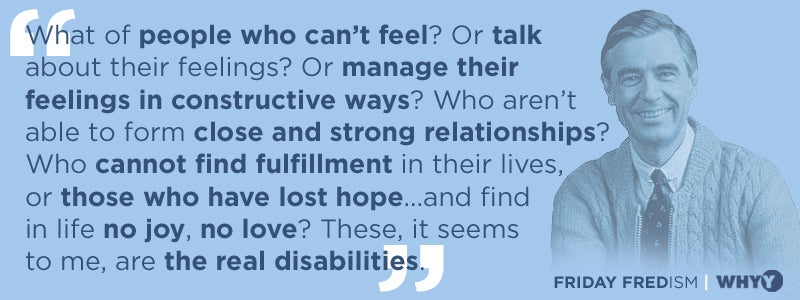
As with religion (and Mister Rogers was a religious man), it’s easier for people to return to a message like Fred’s when they’re looking for guidance, when they feel lost, insignificant, powerless, unlovable, … hopeless. When they’re raising kids and looking for help to respond to the difficult questions that come their way. When they need to draw from someone or something greater than themselves. When the world, to put it delicately, sucks.Mister Rogers was a great man, but just a man, no greater than you or me in any particular way. His openness about his own humanity is one of the reasons he remains significant.
He was an evangelist. He didn’t preach that we should follow him, but rather that we all have the potential inside of us to be good and to do good.
Through a chiming Trolley, some borderline-churchlike songs and a few cheesy hand puppets, Fred Rogers reminded us that we are all human beings who need to be conscious of our emotional and social well being. True strength doesn’t require muscles or missiles.
Mister Rogers does not give up on us. Mister Rogers is not scared of the monster you see in the mirror. He knew it was there all along, and — get this! — he has one, too.
A legacy of honesty, playfulness, warmth and wisdom
That said, Fred Rogers still represents all that is right and good. It’s easy to make fun of that, but he’s an icon for a reason.
Children today are learning important life lessons from “Daniel Tiger’s Neighborhood,” and (if they’re lucky) classic episodes of “Mister Rogers’ Neighborhood.” Those of us who are young parents remember him. Our parents and grandparents remember him. He crosses generations, inevitably leaving the same mark on all of them. He’s a seed that gets planted, then blooms into a really, really important flower later on … if you decide to nurture it.
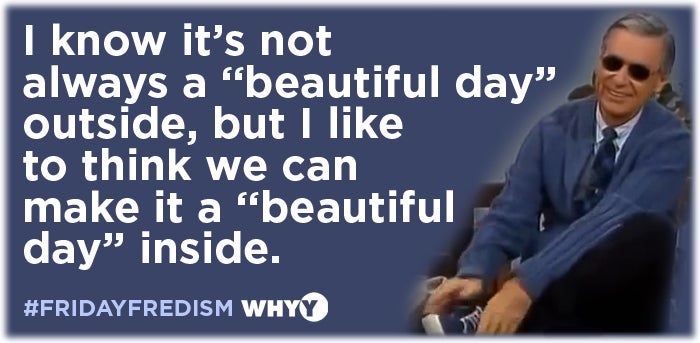
When his quotations pop up in little shareable images on our Facebook wall, they’re tapping into so many things. He’s closely identified with PBS, nostalgia, and general human decency in a world dominated by images of sex and violence; the longing for a simpler time that may never have existed in the first place; the wonder that is a great teacher; and so much more.
He puts to words things we should already know and already be doing, and he never makes us feel dumb for not remembering.
He is so genuinely lovable, so worthy of our attention and respect, more than a decade after he left us.
It happened accidentally, but I really believe we at WHYY would be wise to recognize 2014 as The Year of Fred — and to keep his spirit of honesty, playfulness, warmth and wisdom in mind in the new year and beyond.
We probably all should.
WHYY is your source for fact-based, in-depth journalism and information. As a nonprofit organization, we rely on financial support from readers like you. Please give today.






